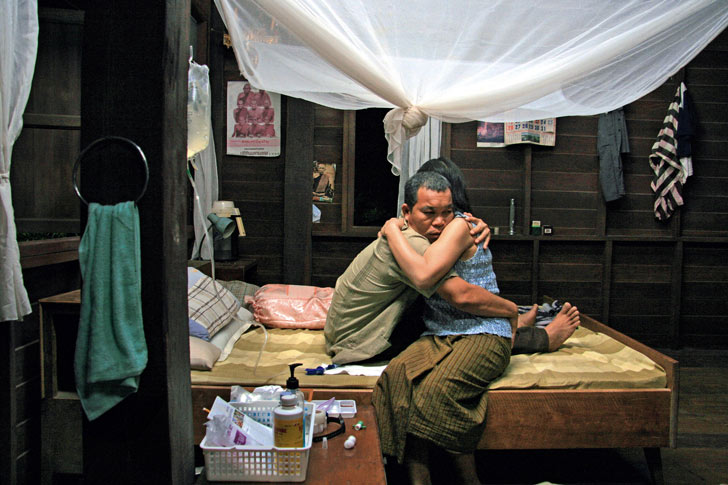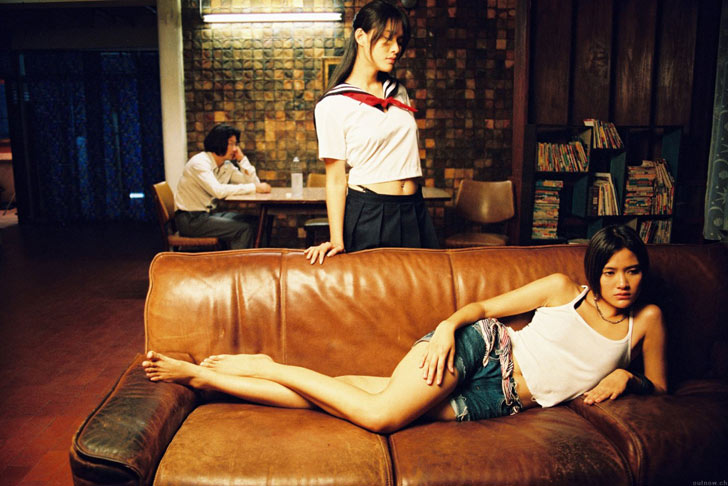Uncle Boonmee Who Can Recall His Past Lives
Confession: my only previous exposure to Apichatpong Weerasethakul, the Thai director who's one of the most lauded auteurs currently working, was a DVD copy of Tropical Malady, which frankly bored my pants off. Watching Uncle Boonmee Who Can Recall His Past Lives on the big screen at the New York Film Festival's Alice Tully Hall, it occurred to me almost immediately that waiting to see anything by Weerasethakul on DVD is a terrible idea. For Uncle Boonmee, the large theater screen works like a window onto a bigger world populated by larger-than-actual-size memories and myths. And the photography is not the kind of crisp, high-contrast work that translates well to home video (though Blu-ray might do OK by it) — shots taken within the Thai jungle, for instance, are unfailingly dense and moody, with different and ever-darker shades of green layered on top of each other like thick brush strokes in an oil painting. Sometimes it feels as if the whole film were shot at twilight, or using day-for-night shooting and processing trickery. When one of Weerasethakul's rare bright daylight exteriors hits the screen, you feel it like waking up at noon.
Uncle Boonmee has a spooky, dreamlike quality that benefits from a directorial style that could best be described as languorous. Weerasethakul likes to hold shots for a long time — though not an absurdly long time — so that we can process, for instance, the face of the film's co-star Jenjira Pongpas after her character, Jen, rolls down a car window so she can catch the breeze across her face as she travels outside of the city to be with her brother-in-law, Boonmee (Thanapat Saisaymar). Her expression becomes a brief mystery story. What can we read there — anticipation? Trepidation? I thought it was a somewhat anxious look, not entirely without optimism but far from contented.
My feeling on that front was confirmed, maybe, when Weerasethakul revealed that the aging Boonmee is dying of kidney failure. He can still supervise work on his tamarind trees and unusually tasty honey crop, but his condition requires constant attention from caretakers, who drain and refill him, like so much rickety plumbing, through plastic tubes that enter the soft flesh of his gut. The first scene showing Boonmee undergoing this particular routine is another one of the director's long takes, and it's both a gentle and terrible look at encroaching mortality. Boonmee makes a point at dinner of adhering to a doctor-ordered diet, but it's no use. He's on the way down, and he knows it.
Uncle Boonmee is less a case study in death by degrees than it is a kind of supernatural fable, or, more specifically, a magical and baffling tone poem on the idea of reincarnation. Beyond its provocative title, the film is none too explicit in that regard. It introduces itself with a brief episode featuring a wayward buffalo (and something else, more sinister looking, out there in the jungle), which raises the question for any halfway attentive viewer: is that one of Uncle Boonmee's past lives? How about the story of the princess and the catfish, a masterful digression that hijacks the narrative partway through, then returns us to the deathwatch? Is he the woman or the fish? And what to make of that cave in the wilderness where Boonmee is taken in his final hours? Shiny minerals sparkle in the dark stone ceilings there, like stars in the night sky, and he says it feels like a womb, that it's the site of his first birth.
Even after the last of Boonmee's life has trickled out, his story isn't over, and Weerasethakul appends a mesmerizing coda that has something to do with Thai politics, Buddhism, and parallel universes. At the first NYFF public screening, Weerasethakul recalled with amusement an earlier press conference during which a critic asked him, “What does this film have to do with quantum physics?” It's not easy to parse the intended meaning(s) of Uncle Boonmee Who Recalls His Past Lives, but you get the sense that a viewer's confusion is itself part of the author's intent. Whatever else Weerasethakul believes about past lives, we don't need to know it.
There's another sense in which Western audiences are truly alienated from this film. Weerasethakul said it's meant in part as homage to Thai films of his youth, telling the NYFF audience that each of the film's six reels, which are all roughly 20 minutes in length, was constructed as a tribute to a different style of native Thai filmmaking. For my part, I feel like he got a lot of mileage out of this strategy — just as I would start to feel a little impatient with the pace of Weerasethakul's storytelling, my thoughts wandering and my ass shifting in my chair, he'd change it up completely. And the 20 minutes we spend with the princess, who pauses to take in her own reflection in the water and then begins to weep with her back to the camera, the gorgeous cascades of a waterfall in the background of the frame functioning as an avatar of her tears, is as fine a stretch of cinema as I've seen in years. This is a sometimes taxing but altogether remarkable film.
Posted by on September 25, 2024 9:58 PM
